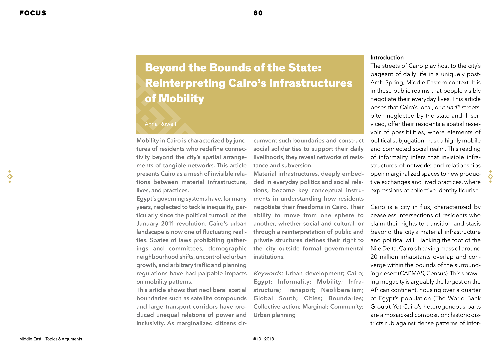Beyond the Bounds of the State: Reinterpreting Cairo’s Infrastructures of Mobility
Cairo is a city in flux, characterized by ceaseless intersections of residents who openly claim their rights to mobility beyond the city’s material infrastructure and political will. Egypt’s governing systems have, for many years, neglected to tackle urban inequality, particularly since the politica...
Gespeichert in:
| 发表在: | Middle East - Topics & Arguments |
|---|---|
| 主要作者: | |
| 格式: | Artikel (Zeitschrift) |
| 语言: | 英语 |
| 出版: |
Philipps-Universität Marburg
2018
|
| 主题: | |
| 在线阅读: | 在线阅读 |
| 标签: |
添加标签
没有标签, 成为第一个标记此记录!
|
| 总结: | Cairo is a city in flux, characterized by ceaseless intersections of residents who openly claim their rights to mobility beyond the city’s material infrastructure and political will. Egypt’s governing systems have, for many years, neglected to tackle urban inequality, particularly since the political turmoil of the January 2011 revolution. Against such a backdrop, this article seeks to understand how informal communities reinterpret structures of political division as expanded spaces of economic and cultural operation. It supports the notion that large segments of Cairo’s populace are in a constant negotiation between autonomy and integration. Compelled by physical and socioeconomic barriers, they carve out selfgovernance and develop structures which give them the freedom to work, socialize, and live in the public arena. This article proposes that Cairo’s local, or baladī streets, often neglected by the state and ill-serviced, offer their residents a spatial reservoir of possibilities, where elements of political subjugation often mask a highly mobile and connected social realm. This reading of informality infers that invisible infrastructures of networks and relationships open marginalized spaces to new productive exchanges and lived practices, where expressions of collective identity flourish. |
|---|---|
| DOI: | 10.17192/meta.2018.10.7589 |
 Publikationsserver
Publikationsserver